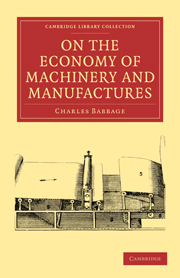Book contents
- Frontmatter
- PREFACE
- Contents
- INTRODUCTION: STATEMENT OF THE OBJECT AND PLAN OF THE WORK
- CHAPTER I SOURCES OF THE ADVANTAGES ARISING FROM MACHINERY AND MANUFACTURES
- CHAPTER II ACCUMULATING POWER
- CHAPTER III REGULATING POWER
- CHAPTER IV INCREASE AND DIMINUTION OF VELOCITY
- CHAPTER V EXTENDING TIME OF ACTION OF FORCES
- CHAPTER VI SAVING TIME IN NATURAL OPERATIONS
- CHAPTER VII EXERTING FORCES TOO GREAT FOR HUMAN POWER, AND EXECUTING OPERATIONS TOO DELICATE FOR HUMAN TOUCH
- CHAPTER VIII REGISTERING OPERATIONS
- CHAPTER IX ECONOMY OF MATERIALS EMPLOYED
- CHAPTER X OF THE IDENTITY OF THE WORK WHEN IT IS OF THE SAME KIND, AND OF ITS ACCURACY WHEN OF DIFFERENT KINDS
- CHAPTER XI OF COPYING
- CHAPTER XII ON THE METHOD OF OBSERVING MANUFACTORIES
- CHAPTER XIII ON THE DIFFERENCE BETWEEN MAKING AND MANUFACTURING
- CHAPTER XIV ON THE INFLUENCE OF VERIFICATION ON PRICE
- CHAPTER XV ON THE INFLUENCE OF DURABILITY ON PRICE
- CHAPTER XVI ON PRICE, AS MEASURED BY MONEY
- CHAPTER XVII OF RAW MATERIALS
- CHAPTER XVIII OF THE DIVISION OF LABOUR
- CHAPTER XIX ON THE DIVISION OF MENTAL LABOUR
- CHAPTER XX ON THE SEPARATE COST OF EACH PROCESS IN A MANUFACTURE
- CHAPTER XXI ON THE CAUSES AND CONSEQUENCES OF LARGE FACTORIES
- CHAPTER XXII ON THE POSITION OF GREAT FACTORIES
- CHAPTER XXIII ON OVER-MANUFACTURING
- CHAPTER XXIV INQUIRIES PREVIOUS TO COMMENCING ANY MANUFACTORY
- CHAPTER XXV ON CONTRIVING MACHINERY
- CHAPTER XXVI PROPER CIRCUMSTANCES FOR THE APPLICATION OF MACHINERY
- CHAPTER XXVII ON THE DURATION OF MACHINERY
- CHAPTER XXVIII ON COMBINATION AMONGST MASTERS OR WORKMEN AGAINST EACH OTHER
- CHAPTER XXIX ON COMBINATIONS OF MASTERS AGAINST THE PUBLIC
- CHAPTER XXX ON THE EFFECT OF TAXES AND OF LOCAL RESTRICTIONS UPON MANUFACTURES
- CHAPTER XXXI ON THE EXPORTATION OF MACHINERY
- CHAPTER XXXII ON THE FUTURE PROSPECTS OF MANUFACTURES, AS CONNECTED WITH SCIENCE
CHAPTER XVIII - OF THE DIVISION OF LABOUR
Published online by Cambridge University Press: 29 August 2010
- Frontmatter
- PREFACE
- Contents
- INTRODUCTION: STATEMENT OF THE OBJECT AND PLAN OF THE WORK
- CHAPTER I SOURCES OF THE ADVANTAGES ARISING FROM MACHINERY AND MANUFACTURES
- CHAPTER II ACCUMULATING POWER
- CHAPTER III REGULATING POWER
- CHAPTER IV INCREASE AND DIMINUTION OF VELOCITY
- CHAPTER V EXTENDING TIME OF ACTION OF FORCES
- CHAPTER VI SAVING TIME IN NATURAL OPERATIONS
- CHAPTER VII EXERTING FORCES TOO GREAT FOR HUMAN POWER, AND EXECUTING OPERATIONS TOO DELICATE FOR HUMAN TOUCH
- CHAPTER VIII REGISTERING OPERATIONS
- CHAPTER IX ECONOMY OF MATERIALS EMPLOYED
- CHAPTER X OF THE IDENTITY OF THE WORK WHEN IT IS OF THE SAME KIND, AND OF ITS ACCURACY WHEN OF DIFFERENT KINDS
- CHAPTER XI OF COPYING
- CHAPTER XII ON THE METHOD OF OBSERVING MANUFACTORIES
- CHAPTER XIII ON THE DIFFERENCE BETWEEN MAKING AND MANUFACTURING
- CHAPTER XIV ON THE INFLUENCE OF VERIFICATION ON PRICE
- CHAPTER XV ON THE INFLUENCE OF DURABILITY ON PRICE
- CHAPTER XVI ON PRICE, AS MEASURED BY MONEY
- CHAPTER XVII OF RAW MATERIALS
- CHAPTER XVIII OF THE DIVISION OF LABOUR
- CHAPTER XIX ON THE DIVISION OF MENTAL LABOUR
- CHAPTER XX ON THE SEPARATE COST OF EACH PROCESS IN A MANUFACTURE
- CHAPTER XXI ON THE CAUSES AND CONSEQUENCES OF LARGE FACTORIES
- CHAPTER XXII ON THE POSITION OF GREAT FACTORIES
- CHAPTER XXIII ON OVER-MANUFACTURING
- CHAPTER XXIV INQUIRIES PREVIOUS TO COMMENCING ANY MANUFACTORY
- CHAPTER XXV ON CONTRIVING MACHINERY
- CHAPTER XXVI PROPER CIRCUMSTANCES FOR THE APPLICATION OF MACHINERY
- CHAPTER XXVII ON THE DURATION OF MACHINERY
- CHAPTER XXVIII ON COMBINATION AMONGST MASTERS OR WORKMEN AGAINST EACH OTHER
- CHAPTER XXIX ON COMBINATIONS OF MASTERS AGAINST THE PUBLIC
- CHAPTER XXX ON THE EFFECT OF TAXES AND OF LOCAL RESTRICTIONS UPON MANUFACTURES
- CHAPTER XXXI ON THE EXPORTATION OF MACHINERY
- CHAPTER XXXII ON THE FUTURE PROSPECTS OF MANUFACTURES, AS CONNECTED WITH SCIENCE
Summary
(159.) Perhaps the most important principle on which the economy of a manufacture depends, is the division of labour amongst the persons who perform the work. The first application of this principle must have been made in a very early stage of society; for it must soon have been apparent, that more comforts and conveniences could be acquired by one man restricting his occupation to the art of making bows, another to that of building houses, a third boats, and so on. This division of labour into trades was not, however, the result of an opinion that the general riches of the community would be increased by such an arrangement; but it must have arisen from the circumstance of each individual so employed discovering that he himself could thus make a greater profit of his labour than by pursuing more varied occupations. Society must have made considerable advances before this principle could have been carried into the workshop; for it is only in countries which have attained a high degree of civilization, and in articles in which there is a great competition amongst the producers, that the most perfect system of the division of labour is to be observed. The principles on which the advantages of this system depend, have been much the subject of discussion amongst writers on Political Economy; but the relative importance of their influence does not appear, in all cases, to have been estimated with sufficient precision. It is my intention, in the first instance, to state shortly those principles, and then to point out what appears to me to have been omitted by those who have previously treated the subject.
- Type
- Chapter
- Information
- On the Economy of Machinery and Manufactures , pp. 131 - 152Publisher: Cambridge University PressPrint publication year: 2010First published in: 1832



